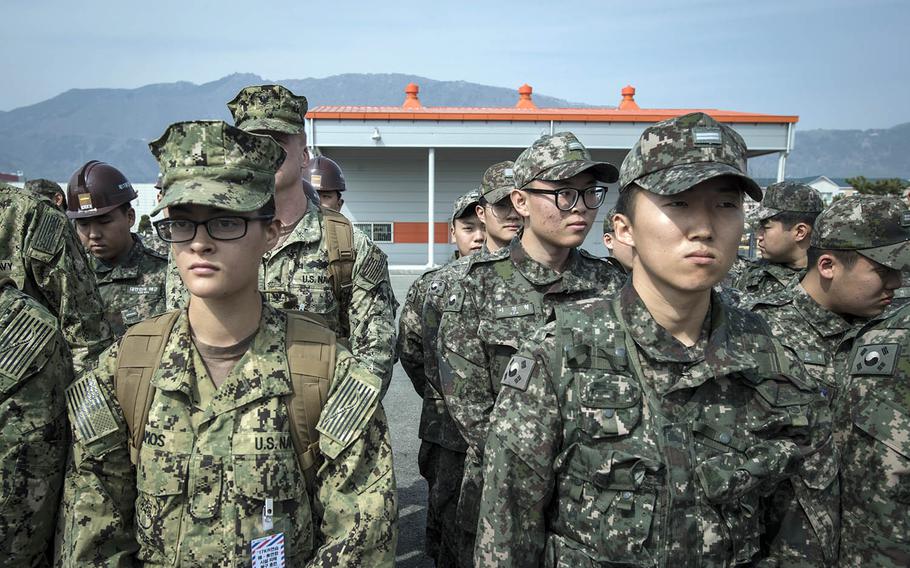
U.S. and South Korean sailors listen to a safety briefing during a Foal Eagle exercise in Jinhae, South Korea, March 13, 2017. (Torrey Lee/U.S. Navy)
SEOUL, South Korea - The United States and South Korea quietly kicked off annual war games involving hundreds of thousands of troops on Sunday in the first major test of a new push for peace with the North.
The military exercises began as President Donald Trump and his South Korean counterpart Moon Jae-in are gearing up for back-to-back summits with North Korean leader Kim Jong Un aimed at resolving the crisis over the communist state’s nuclear weapons program.
About 11,500 U.S. and 290,000 South Korean troops will participate in the annual field-training drill known as Foal Eagle, which began Sunday and is expected to last about a month, according to U.S. and South Korean officials.
A two-week, computer-simulated exercise known as Key Resolve is due to start on April 23 with some 12,200 Americans and 10,000 South Korean military personnel.
The allies are holding the drills later than usual this year after postponing them to help pave the way for the North’s participation in the Olympics and Paralympics, which were held in the alpine town of Pyeongchang.
Defense Secretary Jim Mattis and his South Korean counterpart, Song Young-moo, said in a statement earlier this month that the exercises would be held “at a scale similar to that of previous years.”
But the messaging is as important as the size, and officials have said privately that the allies are keeping it low-key this year.
In announcing the dates last month, Pentagon spokesman Marine Lt. Col. Christopher Logan insisted the exercises are “defense-oriented and there is no reason for North Korea to view them as a provocation.”
Foal Eagle is due to last four weeks, half the duration of the drills last year. The U.S. military also is expected to deploy fewer strategic weapons such as U.S. aircraft carriers and supersonic bombers, South Korean officials have been quoted as saying.
By contrast, the USS Carl Vinson and other warships made port calls to the South Korean city of Busan and the North fired four missiles into the sea off Japan during last year’s games.
Pyongyang’s reaction to the annual exercises will be closely watched as they are usually a touchstone for tensions. The North has fiercely objected to the drills in the past, calling them a rehearsal for an invasion.
But North Korean leader Kim Jong Un reportedly told visiting South Korean envoys that he understood the drills would be held as planned this year.
The state-run media also have been relatively quiet on the issue in recent weeks as diplomatic efforts to resolve the crisis over the country’s nuclear weapons program gained momentum.
The detente followed months of heightened tensions as Trump traded threats and personal insults with Kim, calling him “little rocket man” and threatening to unleash “fire and fury” and to “totally destroy North Korea” if needed to defend the United States and its allies.
Kim, meanwhile, called Trump a “mentally deranged U.S. dotard” as his country demonstrated rapid progress in its efforts to develop a nuclear weapon that could target the U.S. mainland.
Both sides have toned down the rhetoric, and Kim told Chinese President Xi Jinping during a surprise visit to Beijing last week that he is committed to denuclearization, according to the official Xinhua news agency.
The two Koreas also set a date for a summit between their leaders on April 27, the first such meeting between the rival nations in more than a decade.
Trump also agreed to meet with Kim by May in what would be the first U.S.-North Korean summit. But the president said he will maintain his “maximum pressure” campaign seeking to isolate the regime until an agreement is reached.
Experts also warn that Kim is unlikely to give up his nuclear weapons, making a breakthrough unlikely.
The U.N. Security Council, meanwhile, announced new measures against North Korea on Friday. It blacklisted 27 ships, 21 shipping companies and a man accused of facilitating sanctions evasion.
About 28,500 U.S. service members are based in South Korea, which technically remains at war with the North after their 1950-53 conflict ended in an armistice instead of a peace treaty.
Twitter: @kimgamel